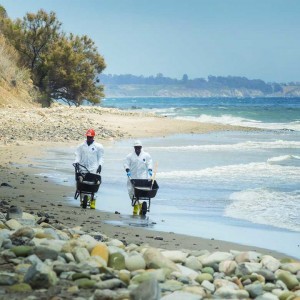Plains All American Pipeline is taking a page straight out of BP’s oil spill response playbook, according to at least one attorney with firsthand experience in oil spill litigation.
Thomas Young, a Tampa-based attorney who went to work trying to secure claims for clients in the aftermath of the BP Deepwater Horizon disaster, told the Business Times that even Plains’ message — doing everything in their power to make it right — is the exact same line BP used during the massive gulf spill.
However, in dealing with BP and the settlement claims program, which only just closed, the company wasn’t exactly bending over backward to make sure people affected by the catastrophe were justly compensated.
“(BP) battled tooth and nail not to pay claims,” Young said. “So I would take everything Plains is saying with a huge grain of salt. The proof will be in the pudding, so to speak, in whether they fight these claims or not. They say they’re committed to making things right, but unfortunately, seeing how this played out before, that could mean something different.”
In the Gulf, Young said he estimates that roughly 80 percent of claimants still haven’t been paid or have no idea if they ever will as thousands of claims, at an average of $200,000, are still languishing in BP’s highly bureaucratic program. The Deepwater Horizon spill happened roughly five years ago; the last day for people to submit a claim was June 8.
While the estimated 100,000 gallons that leaked onto the Gaviota coast from Plains’ extensively corroded Line 901 pipeline pales in comparison to nearly 100,000 gallons per day that flowed from BP’s rig into the Gulf for 87 consecutive days, no one should expect to see all the current claims resolved months, or even years from now, Young said.
A Plains representative told the Business Times that the company isn’t releasing any information regarding claims the company has received to date. According to one media report, a total of 51 claims had been submitted to the company, six of which were from commercial fishing operations.
In a follow up call to Plains’ Joint Information Command center, a company spokesperson wouldn’t confirm these numbers and said there is no plan to make the number of claims or the current total dollar amount of the claims public at this time.
It’s likely that many of the businesses submitting claims would want to keep that information private, but for Plains’ part, disclosing at least the number of claims, their totals as well as those that were denied would be following BP’s actions out of the Gulf. Young said it’s possible Plains just doesn’t have those reporting standards set up yet.
Once a claim is submitted, under the Oil Pollution Act of 1990, a company has 90 days to resolve it. The statute of limitations on claims under the act is three years. Still, Young said he expects the company to take a page out of BP’s playbook and attempt to delay, deny and defend once the spotlight fades.
For Young, the big question is what kind of documentation Plains is having claimants sign in order to receive payment. After the claims process started during the gulf spill, Young said BP was found to have forced some claimants to sign away any future litigation rights against the company as a prerequisite to receiving any payment.
At this point its impossible to know what the long-term damage to area businesses the Refugio spill will have. And while some, like the fishermen and campgrounds affected, might have an idea what their immediate damage is, Young said its his experience that oil companies will use the complicated claims process to nickle and dime claimants.
“They know that many of these small businesses, the fishermen, the restaurants, are not sophisticated operators and offer some kind of short-term payments these people need know to hold them over,” Young said. “But right now they can’t know what the eventual damages will be.”






 Print
Print Email
Email


















